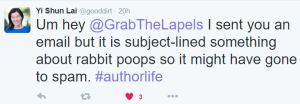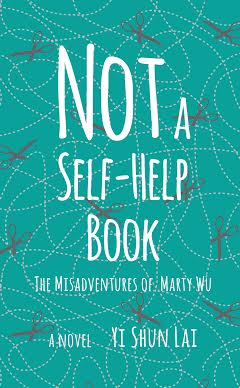I want to thank Yi Shun Lai for answering my questions. I’ve been reaching out to presses that focus on publishing women, and Shade Mountain Press was the first place I contacted to find more women who want to participate in my Meet the Writer feature. It’s a little something I can do when I don’t have enough time to read as much as I would like, but still want to promote writers who are women. I’m so glad I did, as the authors have been warm, responsive, and kind. And Yi Shun Lai has also been terribly funny! This made my day:

Follow her on Twitter! Lai is a woman of many talents and I demand you look at some of her watercolors, which are delightful and heartwarming. Check back at Grab the Lapels soon (after the #20BooksofSummer challenge is over) to read my review of her novel! (I can’t wait!).
GRAB THE LAPELS: What would you like readers to know about your new book, Not a Self-Help Book: The Misadventures of Marty Wu?
Yi Shun Lai: The book offers a comedic take on the 1.5-generation American experience, but as readers and reviewers point out, it resonates with anyone who’s tried to bridge two cultures or tried to find his or her own way in life. If that sounds broad, all the better. College professors are teaching it in classes that range from critical thinking to cultural studies and creative writing, so that’s an indicator, too. And the two or three book clubs I’ve visited that’ve read it comprise entirely, um, non-immigrants.
Really, it’s an American story that goes untold, far too often. And, equally often, immigrant stories are wrongly assumed to be inaccessible to anyone except immigrants. I hope this book is a tiny shift in the right direction.

GTL: Did you learn anything from writing your book?
YSL: Oh, so, so much. I’ll try to be pithy, with the caveat that this is not all of what I learned:
- When you’re writing your first novel, it’s tempting to spill all the beans. You know, engage everything you know; everything you’ve learned. Use all the literary tricks! Recap all the funny little incidents and occasions you’ve collected and thought up! Find places for all the secondary characters you want! Yeah, don’t do that. It’s not efficient, and much of what you’ve thought up or learned won’t serve the narrative you’re working on right now. Pick and choose. Or, sure, write ‘em all in. And then edit most of them out. The stuff on the cutting-room floor will find room in other works you write later.
- Along those lines: Truth is stranger than fiction. You risk tipping the scales of verisimilitude if you don’t choose the right truths to tell, and in the right fashion, too. (For “right,” read “right for the story and character”).
- My friend Roz Ray said, “Writing is a solitary sport; publishing is a team endeavor.” I mostly agree with her, but there are parts of writing that are very much team endeavors. For a few instances: When you are too close to your work. When you cannot see the plot hole for all the rigamarole you’ve woven around it in an effort to sound smart or well read or lyrical or whatever. When you forgot that your character needs to suffer in order to make the plot move forward. That stuff.
- Your protagonist must protag. This sounds utterly obvious. But when you have been living with someone forever, or however long it takes you to write your novel, you do not want them to work hard. This results in lack of protagging. (I stole this phrase from my friend John Brantingham, a writer and professor of writing. I’m reasonably sure it’s not a real word, but it totally exists in my head). Some might differ, but I find it good to just remind myself every once in awhile that your main character could cause the messes s/he encounters over the narrative, as opposed to just… you know, falling into them.

GTL: In what ways has life outside of academia shaped your writing?
YSL: Well, most of my writing life has been outside of academia. In fact, I’ve heard parts of my writing career denigrated as being “not real writing.” I got my start in magazine writing and then moved on to copywriting. I firmly believe these kinds of writing are real writing. And furthermore, they paid my bills for a very long time. Further furthermore, I really, really enjoyed that kind of writing, and still do. (I wrote for catalogs, from the J. Peterman catalog to a plus-size lingerie retailer. Those experiences are very much jewels in my writing life).
I think my broad writing experience has influenced the way I write very heavily. I tend to be brief, and I tend to write short (copy for the Peterman catalog averaged 100 words per item description. You had to pack a lot into those hundred words). In my reading, I read British mysteries and (some) thrillers for joy, and I read some literary fiction and narrative nonfiction for sheer pleasure, and YA and middle-grade for the same reason. I aspire equally to the page-turners and the way that YA and middle-grade books elucidate even the most basic of emotions — everything feels new in a YA or middle-grade read.
So my reading, perhaps, has a heavier hand in my writing than my actual writing career does. I find aspiration does much of the heavy lifting in the creative fields, doesn’t it?
GTL: Are there aspects of your writing that readers might find challenging to them?
YSL: I have heard tell that my narrator is frantic. I make no excuses for her. And she has an inveterate potty-mouth. In two languages, sometimes. Sorry.
GTL: What was the first story you ever wrote about?
YSL: It was a second-person narrative in the horror/spec-fic vein. And I wrote it in pencil, but we had to turn it in in pen, so some part of my twisted little logic suggested it’d be easier for me to trace every letter as opposed to just writing the thing all over again in pen, so I did that. Yeah.
I haven’t revisited horror since then. I think that was… 7th grade.
No! I’m wrong. The very first thing I ever wrote about was a play about Hello Kitty, written with my cousin Rachel. I can’t remember when. And then later there was a collaborative piece of fiction about my high-school debate team. Hunh. I wonder if that has legs as a YA novel. Hey-o! You read it here first.
GTL: What did you want to be when you grew up, and does this choice influence your writing today?
YSL: I wanted to be a magazine editor. Yes, really: When I was seven I was paging through Vogue and I thought it’d be so cool to be on the masthead. I still remember the glossy paper; the heavy pages; the utter joyful surprise at seeing all those people’s names in that neat, centered column.
It turns out, I’m not very organized and I’m also not very good at the journalistic truth, so off to fiction I went.
Does this choice influence my writing? Hm. Not so much. I regretted, for a while, not making it to the top of the masthead. But then I moved on. And now I edit nonfiction at a literary journal, anyway, so… that’s kind of the same thing, isn’t it? [Cue brainfart.]
Special Note: Yi Shun Lai’s publisher, Shade Mountain Press, is now accepting submissions from African American women until September 1, 2016. If you, or anyone you know, is interested, please head to the guidelines page!

Yay, Shade Mountain Press! I will be reading a few of their books in the coming months and hopefully I can secure an interview as well. The more interviews authors do, the better, right?
This book sounds like one I need to read. I am .5 generation immigrant, but the experience is essentially the same as 1.5 generation, at least for me because I came to America as a wee child so all I know is America. I’m curious to see what kind of commentary this book makes on that experience.
This interview was delightful, Melanie! Thanks for sharing. She really is hilarious. 😀
LikeLiked by 2 people
Thanks, Naz! I’ve interviewed four women from SMP now, and I worked with another one a book blog tour a couple of years ago. A small but wonderful group!
LikeLiked by 1 person
Your web site is amazing, Naz! I’ll definitely be checking into it more often, now that I know it exists. Thanks for everything you do to promote diverse literature. And THANK YOU for reading this interview. 🙂
LikeLiked by 1 person
Thank you for the kind words!
I throughly enjoyed the interview and hope to read your book in the coming months. Perhaps I could also do an author feature or interview along with my review? I will reach out to you when the time comes!😊
LikeLiked by 1 person
Yes, absolutely! i look forward to hearing from you. Contact details at my web site.
LikeLike
This was so much fun, Melanie! Thanks very much for having me on. What an honor to be included.
LikeLiked by 1 person
You’re welcome, Yi Shun. Can’t wait to read the novel! I also have Parks and Kearns forthcoming as features.
LikeLike
What a fabulous interview! I love Lai’s sense of humour! Will def. add her book to my list! Also, ‘Your protagonist must protag’. All the yes to this!
LikeLiked by 1 person
Totally. And Shade Mountain is a great press to support. I loved Her Own Vietnam.
LikeLike
Oh, thanks so much, Lectito! Looking forward to hearing what you think!
LikeLike
This sounds like a great read, right up my street, I’ll be adding it to my wish list. I do enjoy reading these interviews!
LikeLiked by 1 person
Thank you so much! Shade Mountain Press is a small operation, so they would benefit greatly from purchasing via their website.
LikeLike
[…] Thanks to it’s diary format, The Misadventures of Marty Wu by Yi Shun Lai is a conversational, knockabout book about a young woman straddling two worlds, both of which equally embrace and shun her. Lai visited Grab the Lapels back in August 2016 for the Meet the Writer feature. Check it out here! […]
LikeLike